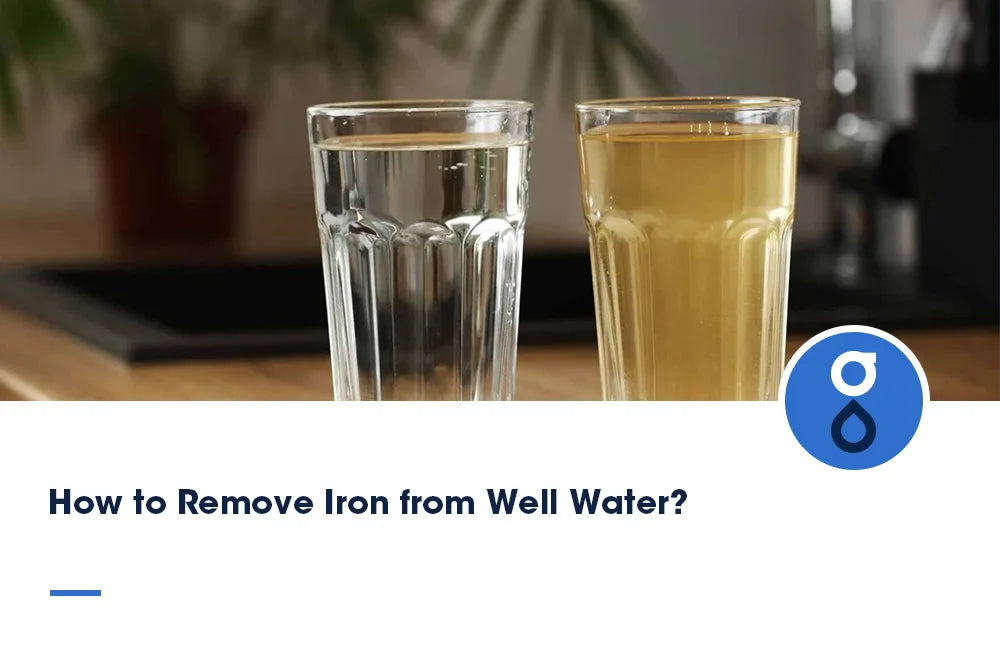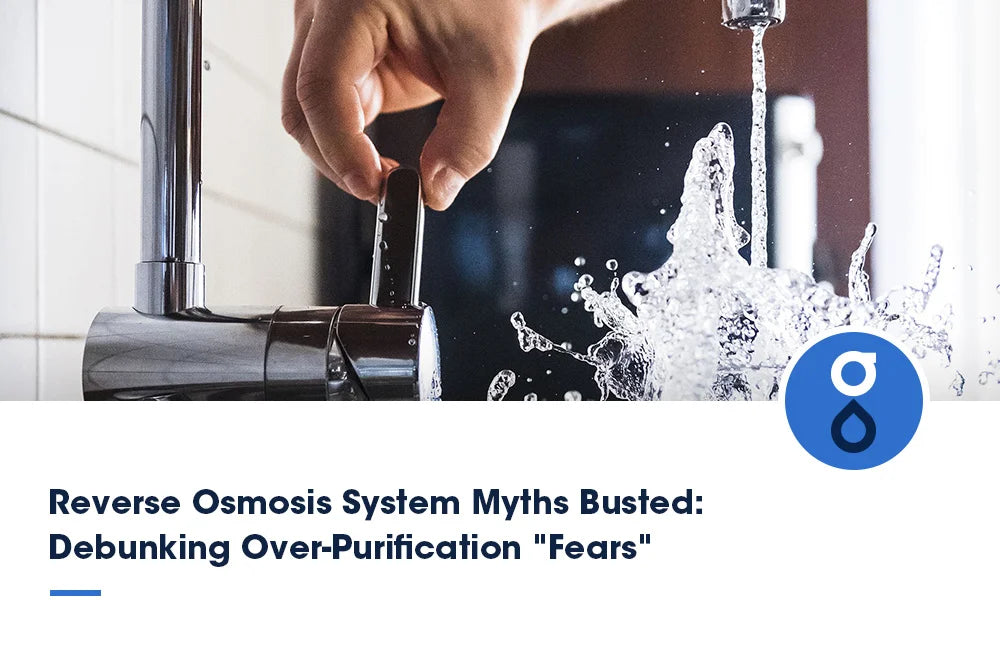Table of Contents:
Why Do You Need to Remove Iron from Well Water?
What Are the Different Forms of Iron Found in Well Water?
What Are the Most Effective Ways to Remove Iron from Well Water?
Can a Water Filter Remove Iron from Well Water?
How to Choose the Right Iron Removal System for Your Well?
How Often Should You Maintain or Replace Your Iron Filter?
Conclusion
The existence of iron in water is, to many homeowners who depend on independent wells, one of the most annoying water quality problems. It leaves stains in sinks, tints clothes, and may also impart a metallic taste that causes water to be unpalatable. Worse still, it may destroy plumbing systems and make appliances using water less efficient in the long run. Then, what is an effective way to remove iron from well water?
Luckily, there are several solutions based on the type of iron present, the amount of water you use in your home, and your filtration requirements. This guide will tell you why it is important to remove iron, what types of iron can be present, and what options are the most effective in filtration, including the products offered by Glacier Fresh.
Why Do You Need to Remove Iron from Well Water?

Iron in well water is much more than a cosmetic problem; the iron is very real in terms of health, maintenance, and usability problems. Although minute quantities of iron do not cause harm to health, high levels can:
-
Toilets, stained sinks, and tubs that appear red-brown, as well as reddish-brown residue
-
Staining and damaging laundry
-
Clog pipes and other fixtures such as dishwashing apparatuses and water heater systems
-
Cause bad flavours and smells in drinking water
-
Nurture the iron bacteria growth that results in slimy deposits and biofilm
In a nutshell, contamination by iron in the water can rather easily become a costly and annoying experience unless managed. This is the reason why the installation of an iron removal system appropriate to one's needs is essential.
What Are the Different Forms of Iron Found in Well Water?
Knowing the kind of iron you have is also important before deciding on the mode of treatment to use. The most common three forms of iron found in well water include:
-
Ferrous Iron (Clear Water Iron): Undissolved and non-visible in newly-drawn water, but it oxidises (and becomes rusty) on contact with air.
-
Ferric Iron (Red Water Iron): This one is not soluble in water and can be spotted as reddish or orange-red-colored particles of the substance.
-
Iron Bacteria: These are microorganisms that consume the iron and form slime, which can foul plumbing systems and filters.
-
Organic Iron: Iron that is tied to naturally occurring organic substances, i.e., tannins. It is hard to eliminate, and it needs expert filtration.
The solution to this problem is testing your water and determining the type of iron and the level of its concentration. This is just after which you can choose a proper and good removal technique.
What Are the Most Effective Ways to Remove Iron from Well Water?
It has no universal solution. The suitable technique is determined by the iron content, the amount of water used, and whether it is to treat the entire home or just drinking water. Some of the best solutions today are shown below.
1. Under Sink RO System – Glacierfresh U03
A reverse osmosis system is one of the most effective steps in the elimination of dissolved iron (ferrous) in drinking water. The U03 Glacierfresh under-sink RO system is most suitable for this.
This system with a 5-stage purification process and 800GPD capacity is able to eliminate iron, heavy metals, sediments, chlorine, and over 1,000 other contaminants. It is small, not too hard to install, and it provides water of ultra-purified quality directly into your tap- this is ideal during both cooking and drinking.
When it comes to treating iron throughout the home, RO systems will not be appropriate, but they will be ideal when it comes to point of use in the kitchen or RVs, where water can be of great quality.
2. Gravity Water Filter Systems
Gravity water filter systems are also an ideal solution if you want a non-electric, portable product--especially when it comes to small homes or emergencies. Such systems use the power of gravity to water through various filter stages, and may incorporate ceramic and carbon filters, which can lower the levels of iron.
Not as potent as RO or softening systems, gravity filters will suit people with moderate concentrations of iron and who are interested in low-maintenance options that do not involve chemicals.
3. Glacier Fresh Portable RV Water Softener
To people who travel or own mobile homes, iron in well water is still a problem, and one that is particularly prevalent in campgrounds. The Glacier Fresh Portable RV Water Softener is one of the best-rated on the market that treats hard water and lowers the level of iron when one is on the move.
It is a compact softener that is simple to connect to the RV plumbing, eliminates the iron and calcium that attracts the formation of scale and stain, and enhances the taste and quality of water wherever you are. It can be reused, it can be easily recharged using table salt, and it is specific to iron and hardness problems typical of the wells in homes.
Can a Water Filter Remove Iron from Well Water?
The brief response: yes, however, it should be a filter that is made to remove iron.
Normal carbon filters or pitcher filters are not very effective against iron, particularly at the higher levels. You will require special filters that have media such as:
-
KDF (Kinetic Degradation Fluxion): Fantastic on iron and chlorine.
-
Birm or Greensand: Oxidizes and removes iron and manganese.
-
Catalytic carbon: Is capable of helping remove some organics and iron in combination with the oxidizers.
To be safe, always make sure that the water filter is rated to remove iron; just look at the specifications. A multi-stage system or oxidation filter may be required in case your iron concentration is more than 3-5 ppm.
How to Choose the Right Iron Removal System for Your Well?
The process of water testing precedes the choice of the right system. Measure:
-
Iron level (ppm)
-
Species of iron (ferrous, ferric, bacterial, organic)
-
Hardness and pH of water
-
Consumption of water per day
After you obtain such information, align the solution to your requirements:
-
A good under-sink RO system, such as the Glacierfresh U03, is very effective where a drinking water system is required.
-
The Glacier Fresh Portable RV Water Softener is ideal when it comes to portable or RV installations.
-
To remove iron throughout the entire house, use an oxidation filter, air injection, or iron-removing water softeners.
You may also be advised when it comes to professional water testing services or consultation with filtration experts.
How Often Should You Maintain or Replace Your Iron Filter?

Maintenance of an iron removal system should be done regularly to ensure optimum efficiency. The general guide is as given below:
RO systems: Change pre-filters at 6-12 month intervals; RO membrane at 2-3 years.
Gravity filters: Rinse clean ceramic filters weekly; replace as required.
Water softeners: Salt recharge them regularly and clean the resin bed after every few months.
Iron filter with media: Backwash periodically; Replace media every 3-5 years, depending upon usage.
The instructions provided by the manufacturer should always be used, and the water quality should be observed closely to notice any reduction in performance, such as stains, smell, or taste recurring.
Conclusion
The presence of iron in well water is not an exception, and it should not be an ongoing problem. Be it a metallic-flavored drinking water, a stained laundry, or a blocked pipe, the trick is to eliminate the iron in well water through the appropriate method in your case.
Whether it is the high-performance Glacierfresh U03 Reverse Osmosis System or the easy-to-use Glacier Fresh RV Water Softener, there are effective solutions that can transform your home or road back to clean, iron-free water.
Waiting until iron causes damage to your plumbing or appliances is not a good idea. Get the right system installed now and have fresher, safer water tomorrow.
Related reading:



















